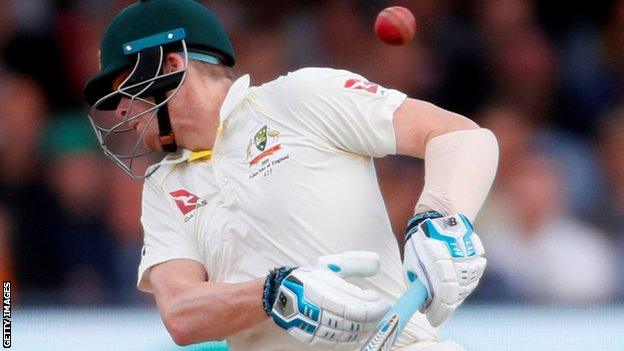Steve Smith: Brain injury charity says it was 'incredibly dangerous' to resume innings
- Published

Smith retired hurt on 80 but later returned before being dismissed for 92
It was "incredibly dangerous" for Steve Smith to resume his innings in the second Ashes Test at Lord's, brain injury charity Headway has claimed.
Smith was hit in the neck by a 92mph bouncer from Jofra Archer on day four but passed an initial concussion test and returned to continue his innings.
However, a subsequent test revealed concussion and he missed the final day.
"You need to take an 'if in doubt' approach," Headway deputy chief executive Luke Griggs said.
"All that time while he was out there, there has been all this brain activity and a concussion going on and it is exactly why he should have rested in that time and not put himself back in immediate danger.
"You have to be over-cautious when it comes to any type of concussion.
"The reaction time of a batsman facing a 90mph-plus delivery is incredibly small and yet it is absolutely vital they are fully concentrated.
"With concussion, the vision can be blurred and the brain can be slow at processing information. That leads to delayed reaction times and is just incredibly dangerous."
Australia confirm Smith is being assessed
The comments came after Australia's sports medicine manager Alex Kountouris confirmed Smith would have to go a "full 24 hours" without any concussion symptoms before being allowed to resume training.
Defending the decision to allow Smith to resume batting in the first innings, Kountouris said: "If we pulled him in the game then it would have been a case of pulling someone who did not at the time have concussion.
"It is pretty clear for us. We have a doctor, we have protocol. He is an expert in his field. He was very confident that at the time that he did not have a concussion at the time so we let him play."
Smith was allowed to be substituted for the second innings owing to new rules brought in by the International Cricket Council this month to allow replacements for players suffering concussion. His replacement, Marnus Labuschagne, scored a valuable 59 as Australia battled to secure a draw in the match.
Neck guards
Neck guards have been commonly used since the death of Phillip Hughes in 2015 and there has been a debate as to whether they should be mandatory. Smith has to date chosen to use a helmet without a neck guard, claiming that he finds the design uncomfortable.
Griggs added: "There are some rules in about neck protection, but they are not mandatory. I know that people say it restricts movement but surely the time has come to look at this again?
"We need to make these mandatory or we might face another tragedy."
Former England cricketer Michael Vaughan has also stated neck guards should be required equipment, telling the Tuffers & Vaughan podcast: "I think it is getting to that stage.
"Yes, they should be mandatory but they are going to have to make a few different styles."